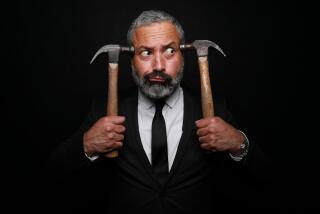Once-Detained Doctor Harbors No Grudge
- Share via
SAN ANTONIO — Al-Badr Al-Hazmi was among the first Muslim men detained by the FBI after the Sept. 11 attacks, and during his 12 days behind bars, whispers from investigators all but convicted him of being a foot soldier in Osama bin Laden’s terror brigade.
But the Saudi doctor was released when it became clear he had nothing to do with the attacks, and over the past three months he has settled back into his daily routines of work, family and his Muslim faith.
“My experience was only 12 days--it’s gone, it’s history,” said Al-Hazmi, 35, a radiology resident at the University of Texas Health Sciences Center.
Al-Hazmi realizes he was taken into custody during a fearful and frenzied time, but he struggles with the fact that many of the same people jailed with him in September are still there without being charged with crimes.
“I am bothered by the number of detainees now, and I think I share this emotion with a number of Americans,” he said. “I’ve been in that situation. . . . If they got somebody who’s innocent, I’m praying for that innocent guy to be released.”
Federal officials say nearly 1,200 people have been arrested or detained as part of the Sept. 11 investigation, many of them accused of violating immigration laws. Nearly all are from the Middle East.
So far, only one person has been formally accused of being involved in the attacks on the World Trade Center and the Pentagon. Zacarias Moussaoui, a French national of Moroccan descent, was indicted this month.
Although Al-Hazmi has easily stepped back into his life, his wife and three young children still worry.
“They’re a little bit scared when I leave them--they were not like this before 9/11,” he said. “They’re scared of anybody knocking at the door after [the FBI] came at 5 in the morning.
“If I go out for one hour and I stay for two hours, they become scared, especially my wife--she’ll page me like five times in one hour. I understand; when I compare my ordeal to her ordeal, it’s nothing, because she was in a sea of unknowns.”
Authorities took Al-Hazmi from his rented townhouse in pajamas and handcuffs on Sept. 12, and for more than a week, he waited in a New York-area lockup for a chance to explain they had the wrong man.
It was a collection of coincidences that sent up red flags around Al-Hazmi.
Two of the hijackers had the same last name. He had exchanged phone calls with a man named Bin Laden two years ago. He had visited Washington in recent months. He had an airline reservation for Sept. 22, when some thought another round of attacks might come. Two Muslim men were caught on a San Antonio-bound train with a large amount of cash and box-cutters.
News reports, fueled by unnamed investigators, tied Al-Hazmi to the terror plot. He was a money man for the operation, said some anonymous sources, while others linked him to the detained men from the train.
In the end, Al-Hazmi’s explanations cleared away all suspicion. The warrant holding him as a material witness was dropped, and U.S. Atty. Mary Jo White said, “He was not and is not a subject of this investigation.”
Al-Hazmi flew back to San Antonio on Sept. 25 something of a celebrity.
“Everybody recognizes me,” Al-Hazmi said. “Everybody wants to help me, everybody wants to shake hands with me, so I think I’m more welcome than before.
“ ‘Please forgive our mistakes; it was a horrible mistake’--people talk to me as if they were the ones that did this, and they had nothing to do with it,” he said. “It was just a nation trying to secure its borders.”
Longtime friends and co-workers at the health science center say he’s the same Dr. Al-Hazmi.
Abdulla Mohammad, a native of Kuwait who has known Al-Hazmi since the doctor arrived in San Antonio in 1997, said: “He’s still calm, he still has a sense of humor.”
“This puzzled a lot of us,” Mohammad continued. “He understands the purpose behind this is not bad luck, but rather as a test from God, and he prays he did OK.”
Al-Hazmi, who prayed frequently while incarcerated, now asks Allah to protect his fellow Muslims in the United States.
“Everybody is looking at them as if they are guilty till proven otherwise,” he said. “It seems like whatever Muslims do nowadays, it’s not enough. They showed emotion, they gave donations, they put on blood drives--they did what every American did.”
His voice rarely rises as he recounts experiences that might leave others seething--the way he was seized from his home; agents taking away the eyeglasses he needs to see; being kept locked up for six days without knowing why, and two extra days before he could meet with his lawyer.
Al-Hazmi shrugs off any suggestion that how he is dealing with it is somehow noteworthy.
“Anger does not serve any purpose,” he said. “It just destroys your heart and your mind. . . . I hope I will keep this same philosophy till I die.”
More to Read
Sign up for Essential California
The most important California stories and recommendations in your inbox every morning.
You may occasionally receive promotional content from the Los Angeles Times.













